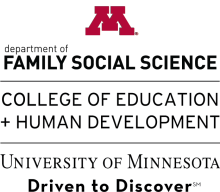2017 NCFR Plenary Speaker: Linda Burton
Session sponsored by the Regents of the University of Minnesota, through its Department of Family Social Science
Linda M. Burton, Ph.D., is the dean of Social Sciences and the James B. Duke Professor of Sociology at Duke University.
From the Presenter
In this presentation I recount a complex case study of 7-year-old Andre, a bi-racial respondent, whose family network I have followed in a 30-year ethnographic study of the family life course, race, and poverty in an isolated small town in Pennsylvania. I chronicle the ways in which structural and contextual factors including geographic isolation, unemployment, class inequality, racism, colorism, inter-racial childbearing, violence, and a growing drug economy reached inside and moved through generations of Andre’s family and launched him on a precarious pathway of childhood adultification characterized by a misappropriated racial identity. In the best of situations, a healthy racial identity can buffer children from the impact of continuous streams of trauma — trauma that Andre knows all too well.
Andre’s case study is particularly insightful in that through a set of serendipitous circumstances one of my adult daughters became Andre’s and his 2-year old sister’s guardian. With my daughter as the primary co-parent, Andre and his sister are now being raised by her, my adult son, my other two adult daughters, my son-in-law and me. It is indeed a family affair. In conveying Andre’s story, I describe how myriad familial and contextual factors initially stunted the development of his racial identity in ways that compromised the “color advantage” for social mobility his biological parents believed they had given him via inter-racial mating. I also discuss how a contextually-embedded sense of fatalism and childhood adultification gave rise to what could have become a terminal life course trajectory for Andre. Through it all, Andre has triumphed, and in his new living situation he teaches my family every day about the value of caring for others, the utility of humanist ethnography, and that sometimes we are beckoned to cross standard research boundaries to redirect the life course of a child. Certain dire circumstances in children’s lives demand that we answer that call.
Dr. Burton's plenary session will take place Friday, Nov. 17, 2017, from 10-11:45 a.m. Eastern.
About the Presenter
Linda M. Burton, Ph.D., is the dean of Social Sciences and the James B. Duke Professor of Sociology at Duke University. She was recently a member of the Committee on the Science of Research on Families for the Institute of Medicine, the Advisory Board of the National Center for Marriage and Family Research, the Board of Directors for the Family Process Institute, and the Board of Directors for the Council on Contemporary Families. In 2013 she was inducted into the Sociological Research Association and is also a recipient of the Dean’s Excellence Award in Mentoring, Duke University, the Distinguished Career Award for the Family Section of the American Sociological Association, the Alexis Wiley Award for Outstanding Research in Family Science, the Family Research Consortium IV Legacy Award, and the American Family Therapy Academy Award for Innovative Contributions to Family Research. Dr. Burton directed the ethnographic component of Welfare, Children, and Families: A Three-City Study and is principal investigator of a multi-site team ethnographic study (Family Life Project) of poverty, family processes, and child development in six rural communities. Her research integrates ethnographic and demographic approaches and examines the roles that poverty and intergenerational family dynamics play in the intimate unions of low-income mothers and the accelerated the life course transitions of children, adolescents, and adults in urban and rural families.
A Message from Dr. Burton
Dear Colleagues and Friends,
I am looking forward to seeing you soon and to sharing my presentation with you. I am not presenting a formal paper, but rather a case study of a young boy and his family that reflects a number of themes that appear in the papers listed below. Please read the papers in the order noted as they provide insights to my conceptual and empirical journey over nearly 30 years as I came to understand the structural forces and family processes across four generations that would ultimately shape this young boy’s early life course. I look forward to your comments and questions.
-
Burton, L. M. (1990). Teenage childbearing as an alternative life-course strategy in multigeneration black families. Human Nature, 1(2), 123-143.
-
Burton, L. M. (2007). Childhood adultification in economically disadvantaged families: A conceptual model. Family Relations, 56, 329-345.
-
Burton, L. M., Bonilla-Silva, E., Ray, V., Buckelew, R., & Hordge-Freeman, E. (2010). Critical race theories, colorism, and the decade’s research on families of color. Journal of Marriage and Family, 72, 440-459.
-
Burton, L. M., Garrett-Peters, R., & Eason, J. (2011). Morality, identity, and mental health in rural ghettos. In L. Burton, S. Kemp, M. Leung, S. Matthews, & D. Takeuchi (Eds.), Communities, neighborhoods, and health: Expanding the boundaries of place. NY: Springer.
-
Burton, L. M. Lichter, D. T., Baker, R. S., & Eason, J. M. (2013). Inequality, family processes, and health in the “new” rural America. American Behavioral Scientist, 57(8), 1128-1151.



